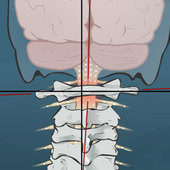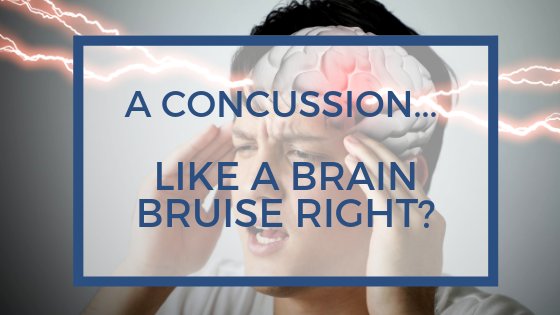
Most people think that a concussion is due to bruising of brain tissue as it makes contact with the inside of the skull, but the injury itself is much more complex. A concussion is described as a cascade of neurological events occurring from a rapid acceleration and deceleration of the head and neck.
The average concussion takes 70-120 of g-force to occur. Neck injuries can occur with only 4 g-force! It's important not to ignore the underlying neck injury, as the two go hand-in-hand.
To get technical, your brain is not just one homogeneous mass of tissue, but rather it is divided into two distinct layers: white matter and grey matter. The two layers are made of different parts of the neuron - the nerve cells that are responsible for sending electrical signals to and from the brain. The injury actually occurs between the two layers; their different densities cause a shearing effect. 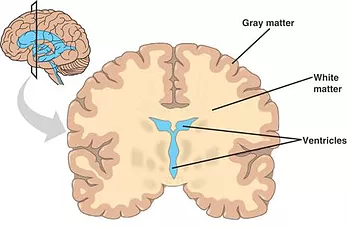
What happens next?
This action sets off a flood of excitatory neurotransmitters, which then prompts the neurons to fire indiscriminately, overstimulating the brain. The cascade causes a huge influx of calcium ions into the cells while simultaneously releasing large quantities of potassium. Because all the neurons are stimulated and firing, they require more energy. However, excess calcium reduces oxygen metabolism in the cell, thus hampering the ability to generate energy. Can you see how this becomes a vicious circle and results in a severe depletion of energy in the brain cells?
The high energy demand, restricted blood flow, and oxygen debt creates an energy crisis that exhausts the neurons, which leads to symptoms like disorientation, mental confusion, or memory failure.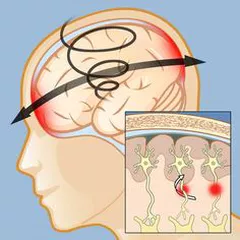
Now what do I do?
Aside from these short-term symptoms, what is even more significant are the longer-term consequences. Think of your brain like a phone battery; if your battery is at 10%, you won’t be able to do all the activities or use all the apps that you would if your phone was at 90%. Luckily with our phones, we can just plug them in and easily recharge. After a concussion, think of your brain as being at 10% battery. The trouble is that we can’t simply plug ourselves in to recharge while we go about doing our normal, daily activities.
This is why resting your brain is so crucial after a concussion.
What does it mean to rest your brain? This means refraining from any stimulating cognitive activity. No reading, no movies, no screen time… you need to eliminate as much external stimulation as possible so your brain can use its remaining energy to undertake the processes that keep you alive. There are many things that your brain needs to do: regulate your heart rate, maintain appropriate ion and enzyme balances, digest your food, assimilate nutrients… all the important processes we do not consciously manage. All of these things require a lot of energy, so it is really important to give your brain the opportunity to do its job properly and allow proper energy reserves to replenish.
Did you know?
After a concussion, the ability of your brain to produce energy is 15% of its normal capacity. Studies have demonstrated that appropriate recovery time for your brain to return to normal energy production is 14 - 30 days.
If you are aware of the signs and symptoms of a concussion, whether suffered from an athletic injury, a fall, or any other type of accident, do yourself the service of treating the injury appropriately. Even if you feel like you have recovered, your brain still needs about a month to get back to normal functioning. 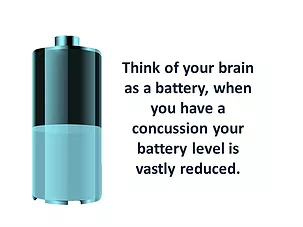
Take the time to heal properly
It isn’t always obvious that someone has had a concussion, and oftentimes people are told to just “shake it off” or quit complaining about it. Everyone recognizes that someone who has broken their leg will need to modify their day-to-day activities for a given time frame as the break heals. Because a concussion isn’t as visibly obvious, our society often does not acknowledge the seriousness of the injury and understand that it requires adequate healing time.
Health care practitioners also need to be very diligent about a thorough history and workup if there is suspicion of a concussion, as their patients will need firm support and guidance to heal properly.
By knowing what actually happens
to your brain in the event of a concussion,
you can give the injury the respect it deserves.
At the Vital Posture™ Clinic, you’ll find a team that is well-trained in treating all kinds of conditions involving head and neck pain, including whiplash and concussion. Don’t wait until your symptoms get worse; we can help rebalance your body and help you begin to feel like yourself again.

Dr. Mylène Hopf
NUCCA Chiropractic
The Vital Posture™ Clinic
Calgary, Canada



